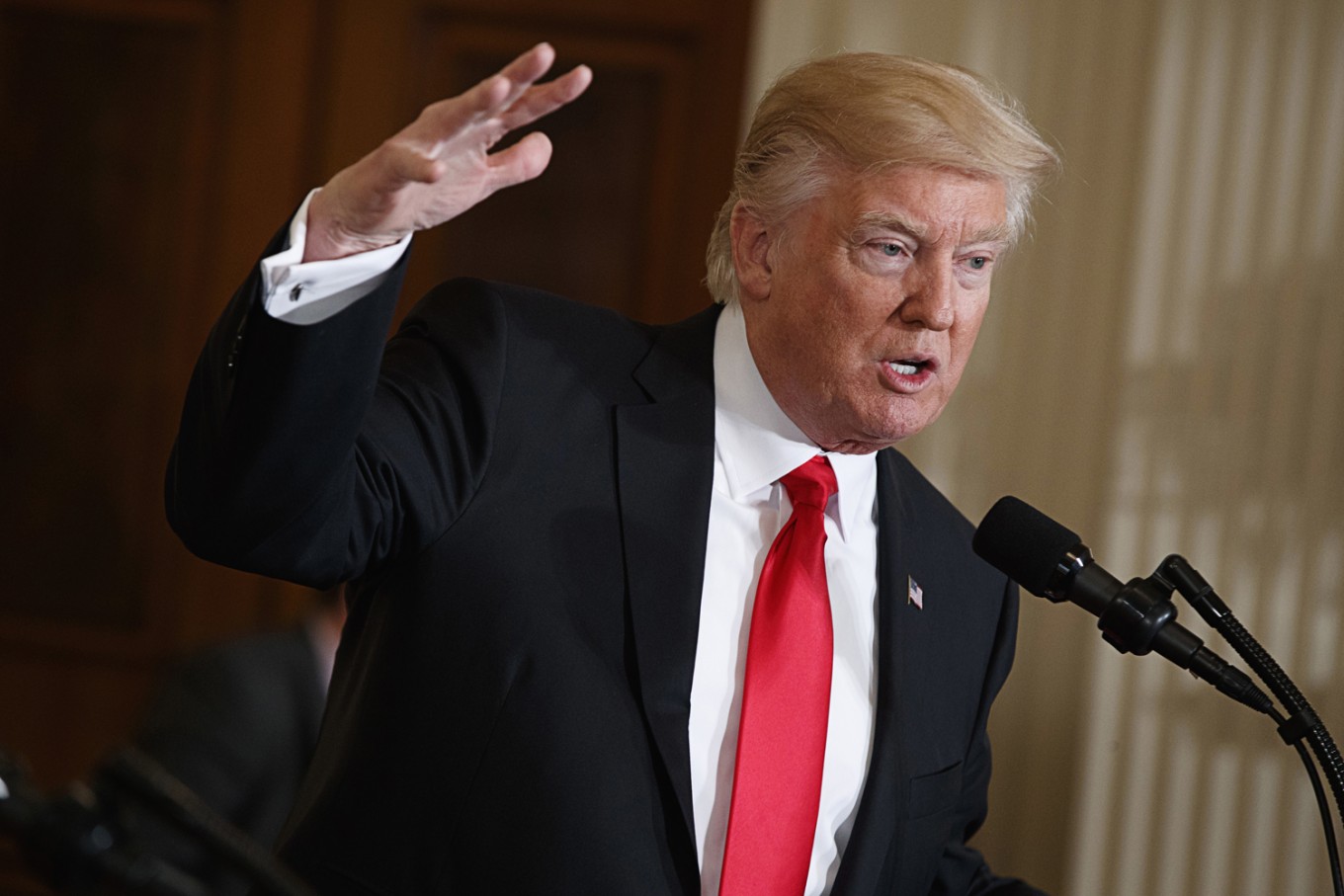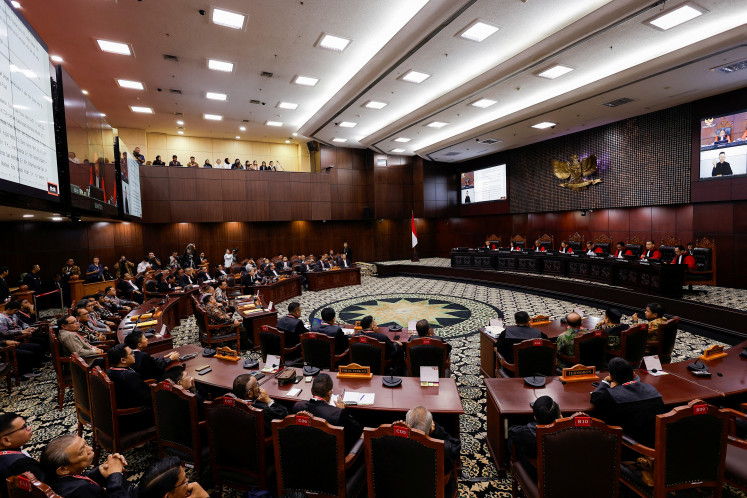Trump's tax plans and how they affect Indonesia
Looking back at his campaign promises, there are at least three significant tax issues in the hands of Trump that may have profound impacts on Indonesia.
Change Size
 President Donald Trump speak in the East Room of the White House in Washington, on Jan. 27. (AP/Evan Vucci)
President Donald Trump speak in the East Room of the White House in Washington, on Jan. 27. (AP/Evan Vucci)
S
o, Donald Trump has been inaugurated as the 45th president of the United States to a rather skeptic a reaction from people around the world. It is worth noting, however, that on his way to being sworn in as the most powerful person in the free world, he broke some amusing records too. For instance, Trump is the only president ever without political or military experience for the office that has a 227-year standing.
In other words, he is the most inexperienced president in American history. And very soon this “Mr. Amateur” needs to confront, yet again, another hurdle he has contentiously put upon himself. Last week, his senior advisers said Trump would not disclose his tax returns to the public, which broke a 40-year-old tradition. By doing so, he avoided revealing to Americans the extent of his financial interests and tax obligations, forsaking his own repeated promise during his campaign to release this information to the public.
Trump’s tax antics spark further questions on how he shapes his country’s tax policies. Though, more importantly for us, how will his tax policies impact Indonesia?
Looking back at his campaign promises, there are at least three significant tax issues in the hands of Trump that may have profound impacts on Indonesia.
First, Trump aims to cut the corporate income tax rate from 35 to 15 percent. Such a significant reduction is designed to boost the attractiveness of the US business environment, in the hope of providing more jobs in the US — one of Trump’s main campaign promises.
The policy however is very precarious, not only to the US tax system but also to tax regimes around the world. Because the tax cut could trigger a worldwide “tax war” in which other countries slash their tax rates to remain competitive in the game and avoid being “outliers”. This race to the bottom will also be harmful to economic development, where countries try to lure investment by giving tax breaks, as superficial bait, instead of improving their “real” fundamental factors of competitiveness such as political stability, strong infrastructure or skilled labor. Ironically, those competitiveness factors are funded and built by tax income.
In the odds that the US corporate rate comes down to 15 percent, the Indonesian economy will face huge challenges because investors could choose to invest in America at a much lower rate than Indonesia — which currently charges a 25 percent statutory tax rate. Things will get even worse if our neighboring countries such as Singapore and Thailand also start slashing their corporate tax rates — currently lower than Indonesia at 17 percent and 20 percent, respectively.
Mind you, slashing the corporate tax rate to stay competitive and thus relying on individual tax collection is also a tricky decision, given the significant contribution of corporate tax revenues on Indonesia’s total tax income. In addition, given the weakness of Indonesia’s tax administration situation, taxing corporations is a lot easier than chasing after large numbers of individual tax payers.
In short, Trump’s corporate tax cut plan will result in Indonesia’s corporate tax regime being seen as less attractive compared to other countries, which may hamper government efforts to boost tax revenue. Furthermore, any plan to cut the corporate tax rate in the name of competitiveness will only hurt the economic development as it may lead to a “tax revenue war.”
Second, Trump wishes to introduce a special corporate tax repatriation holiday rate, whereby corporations with money stashed abroad would be able to pay a tax rate of just 10 percent. Such a move would benefit multinationals like Apple and Microsoft, which currently have billions stashed overseas. Again, this decision is consistent with Trump’s policy to promote business activity “at home” rather than “abroad”, which implicitly encourages US firms to reduce their investment in foreign countries.
If implemented, this decision will have a straightforward impact on Indonesia, as US corporations may reduce their direct investment in Indonesia, e.g. new factory construction or mergers and acquisitions. In addition, it is also possible that the corporations may discontinue to invest in Indonesia’s capital markets and opt to bring money back to the US. Indonesia, however, may still see some silver linings in the horizon as we can still lure multinationals from other countries like China and Japan to continue investing in Indonesia, as long as the political and economic situation remains conducive and stable.
Third, Trump is considered to have a lenient stance in the fight against aggressive corporate tax avoidance activities. This is plausible given his business background, in which he admitted not paying taxes for many years. As such, any government effort to recoup tax from US-based multinationals such as Google will set Indonesia on a collision course with the Trump administration. Trump will probably advise Indonesia and other countries not to tax US-based companies. Consequently the odds of a disagreement over multinationals’ tax obligations is very high.
The situation is apparent in a recent case where the European Commission found Apple unlawfully received special tax treatment in Ireland. Apple was told to pay up to €13 billion (US$19 billion) in back taxes, plus interest, to Ireland after the commission found the technology giant had received “illegal state aid”. The US government sided with Apple in viewing the verdict as being “out-of-step, retrospective and quite extreme”. Indeed, we can expect more of a similar situation in the future. In sum, it seems a stormy season is ahead in regard to Trump’s tax policies and its impact on Indonesia. We definitely need to be ready.
***
The writer is a senior faculty member of the Accounting and Finance Department at BINUS University. He is currently undertaking a PhD at Monash University, Australia.
---------------
We are looking for information, opinions, and in-depth analysis from experts or scholars in a variety of fields. We choose articles based on facts or opinions about general news, as well as quality analysis and commentary about Indonesia or international events. Send your piece to community@jakpost.com. For more information click here.








